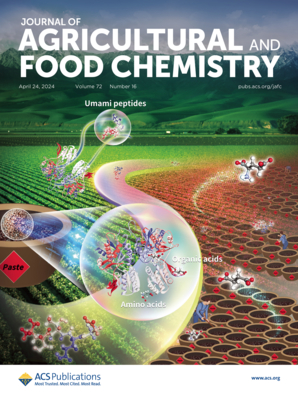传统发酵乳制品中鼠李糖乳杆菌1.0320产生的益生菌和后益生菌通过调节肠道菌群和肠道代谢缓解dss诱导的结肠炎
IF 6.2
1区 农林科学
Q1 AGRICULTURE, MULTIDISCIPLINARY
引用次数: 0
摘要
后益生菌正在成为益生菌的有前途的替代品。然而,它们调节肠道微生物代谢轴、信号通路和多组学相互作用的机制,以及导致其功效变化的关键生物活性成分,仍未得到充分的描述。研究鼠李糖乳杆菌1.0320(益生菌,1.0320)和热灭活鼠李糖乳杆菌1.0320(益生后,HK 1.0320)对葡聚糖硫酸钠(DSS)诱导的溃疡性结肠炎(UC)的保护作用。结果表明,HK1.0320可显著缓解UC症状,减轻结肠损伤,恢复肠道屏障,减轻氧化应激,调节MPO活性,抑制TLR4/MAPK/NF-κB通路关键蛋白(TLR4、MyD88、JNK、p38和p65),减少促炎细胞因子分泌,调节肠道菌群,增强SCFA生成。非靶向代谢组学研究显示,HK1.0320富含羧酸等生物活性成分,可通过自身或肠道代谢修饰缓解UC。本研究阐明了生物后结肠炎的缓解机制,并强调了其在功能食品或精密营养方面的潜力。本文章由计算机程序翻译,如有差异,请以英文原文为准。
Probiotics and Postbiotics Produced by Lacticaseibacillus rhamnosus 1.0320 Isolated from Traditional Fermented Dairy Products Alleviate DSS-Induced Colitis by Modulating the Gut Microbiota and Intestinal Metabolism.
Postbiotics are emerging as promising alternatives to probiotics. However, the mechanisms underlying their regulation of the gut microbiota-metabolite axis, signaling pathways, and multiomics interactions, as well as the key bioactive components responsible for their efficacy variations, remain poorly characterized. This study investigated the protective effects of Lactobacillus rhamnosus 1.0320 (probiotic, 1.0320) and heat-killed Lactobacillus rhamnosus 1.0320 (postbiotic, HK 1.0320) on dextran sulfate sodium (DSS)-induced ulcerative colitis (UC). Results demonstrated that HK1.0320 significantly alleviated UC symptoms, mitigated colonic damage, restored the intestinal barrier, attenuated oxidative stress, regulated MPO activity, suppressed TLR4/MAPK/NF-κB pathway key proteins (TLR4, MyD88, JNK, p38, and p65), decreased pro-inflammatory cytokine secretion, modulated gut microbiota, and enhanced SCFA production. Untargeted metabolomics revealed that HK1.0320 is rich in bioactive components such as carboxylic acids and alleviates UC through its own or intestinal metabolic modification. This study clarifies the postbiotic colitis-relief mechanism and highlights their potential in functional foods or precision nutrition.
求助全文
通过发布文献求助,成功后即可免费获取论文全文。
去求助
来源期刊
CiteScore
9.90
自引率
8.20%
发文量
1375
审稿时长
2.3 months
期刊介绍:
The Journal of Agricultural and Food Chemistry publishes high-quality, cutting edge original research representing complete studies and research advances dealing with the chemistry and biochemistry of agriculture and food. The Journal also encourages papers with chemistry and/or biochemistry as a major component combined with biological/sensory/nutritional/toxicological evaluation related to agriculture and/or food.

 求助内容:
求助内容: 应助结果提醒方式:
应助结果提醒方式:


